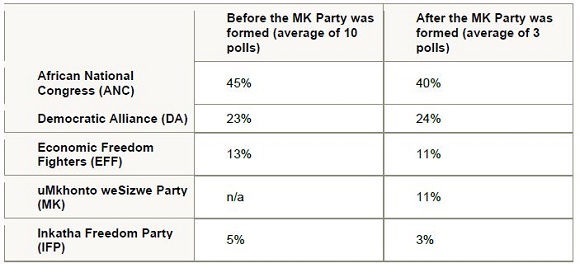SA Election Update - An independent analyst’s view 2024
Political research note - An independent analyst’s view
This political research note was prepared by JP Landman in his personal capacity. Landman is an independent political and economic analyst, and the opinions expressed in this article are his own and do not reflect the views of Nedbank Group.

Image: JP Landman - Political Analyst
4 April 2024
Election update
It is now official: 51 parties will contest the national elections in May, 3 more than in 2019.
The new kid on the block
The one with most media coverage is, of course, Mr Zuma’s uMkhonto weSizwe (MK) Party. Mr Zuma was the number 1 candidate on that party’s list, but the constitution bars him from standing and he was duly disqualified by the Independent Electoral Commission just before the Easter weekend. Mr Zuma knew what he was doing, ie that he is not eligible to stand, yet he tried his luck. He will no doubt still campaign for the MK Party and may even be the face on the party’s posters.
What impact can the MK Party have?
The table below compares the average results of polls before and after the MK Party was formed, and the results for the main parties are clear to see.

The MK Party has taken support from the ANC, EFF and IFP. This trend is confirmed in by-election results in KwaZulu-Natal (KZN) and Mpumalanga. The MK Party has done quite well in the by-elections, largely at the expense of the other 3 parties. Their strongest support is in KZN, where polls give it an average in the high 20s, currently more than any other party. As the poll numbers currently stand, a coalition of the ANC, DA and IFP will be needed to get over the 50% line in KZN.
The MK Party probably benefited from a bounce in the polls with all the hype around its formation. The election campaigns will start in earnest only now, with Easter behind us. Once the party machines have kicked in, the results may very well differ from previous polls.
3 ballot papers
This year, each voter will receive 3 ballot papers, compared to the 2 we used to get. The reason is the inclusion of independent candidates.
- The 1st ballot paper consists of political parties only, and voters will choose 1 as their favourite. This vote is for the first 200 members in the National Assembly.
- The 2nd ballot paper consists of the same list of parties, but now independent candidates are added to the list. Voters can choose a party or an independent candidate. From this ballot, another 200 members of the National Assembly will be elected. The National Assembly consists of 400 people. There are only 6 independent candidates standing for the National Assembly, 1 in the Western Cape, 2 in Gauteng and 3 in Limpopo Province. In the 6 provinces where no independents have made themselves available, voters will not have the option of voting for an independent.
- The 3rd ballot paper is for the provincial parliament or legislature. It will be a combination of political parties and independents running in that province and voters must choose 1. There are 63 parties and 6 independents contesting the 9 provincial elections.
(After all the hullabaloo of changing the electoral system so that independents can run, it is a very meagre harvest.)
The procedure if nobody gets over 50%
A reader has asked how the president will be elected if no party gets to 50%.
The procedure is fairly straightforward. Parliament must meet for its first session within 14 days of the election results having been declared. The election is on Wednesday, 29 May, so the final results should be declared by evening on Saturday, 2 June. This means Parliament must then meet by Sunday, 16 June, at the latest.
At that meeting, a president must be elected from 1 of the 400 members of the National Assembly. If no candidate receives 201 votes on the first round, the candidate with the least number of votes will be eliminated and voting will take place again. This procedure will be repeated until 1 candidate gets the required 201 votes.
In the unlikely event that the last 2 candidates both get the same number of votes, Parliament must reconvene within 7 days and vote again. (That obviously leaves time for horse trading and making deals). If a new president is not elected within 30 days (another few days available for horse trading), Parliament must be dissolved and a new election called. The president and cabinet will remain in their positions in an acting capacity until a new president and cabinet are sworn in.
I don't think anybody in the country has the stomach for another election within 3 months. So, the pressure on the parties to agree on a candidate to become president would be enormous.
The day after …
As I discussed in my last note, I remain of the opinion that an ANC/EFF coalition at national level is unlikely. Ditto an ANC/MK coalition. What can happen when the EFF and MK parties are both shut out of a coalition government? Mr Zuma has already alluded to his ambition that ‘progressive parties’ from the left join forces in a coalition of sorts.
That would bring together the EFF, MK, Ace Magashule's African Congress of Transformation and a few other small left-wing parties like the African Transformation Movement, Pan African Congress and so on.
We will then have the ANC as the largest single party, with the Multi-Party Charter (MPC) formation to the right and another formation to the left.
Should such a reconfiguration emerge, it will be a healthy development. On the right we will have the free-market thinking of the DA, in the middle the social-democratic thinking of the ANC, and to the left the Radical Economic Transformation thinking of Zuma, the EFF, Ace Magashule et al.
If the ANC and the DA form a coalition, either in 1 of the provinces or at national level, it will reinforce the reconfiguration. It will also strengthen the middle ground in our politics considerably, enjoying the support of probably 66% of South Africans.
So what?
- If the MK Party can hold on to the support declared in polls, its main impact would be to undercut the ANC and, paradoxically, put a lid on EFF support.
- The MPC coalition polls at about 33%, which is very far away from the 50% needed to replace the ANC government. Some of the MPC parties may well join a coalition government with the ANC – nationally or in some of the provinces.
- After the election we may see a reconfiguration of parties with clearer policy demarcation – free market, social democratic and radical economic transformation – replacing current identity-driven politics.
- But let’s first wait for the election results.
Happy voting!
Author: JP Landman - Political Analyst
Courtesy: Nedbank Private Wealth Investment Research and Fund Management

Nedbank Private Wealth includes the following entities:
Nedbank Ltd Reg No 1951/000009/06 (NCRCP16) (FSP9363)
Nedgroup Private Wealth (Pty) Ltd Reg No 1997/009637/01 (FSP828)
Nedgroup Private Wealth Stockbrokers (Pty) Ltd Reg No 1996/015589/07 (NCRCP59) (FSP50399), a member of the JSE.






